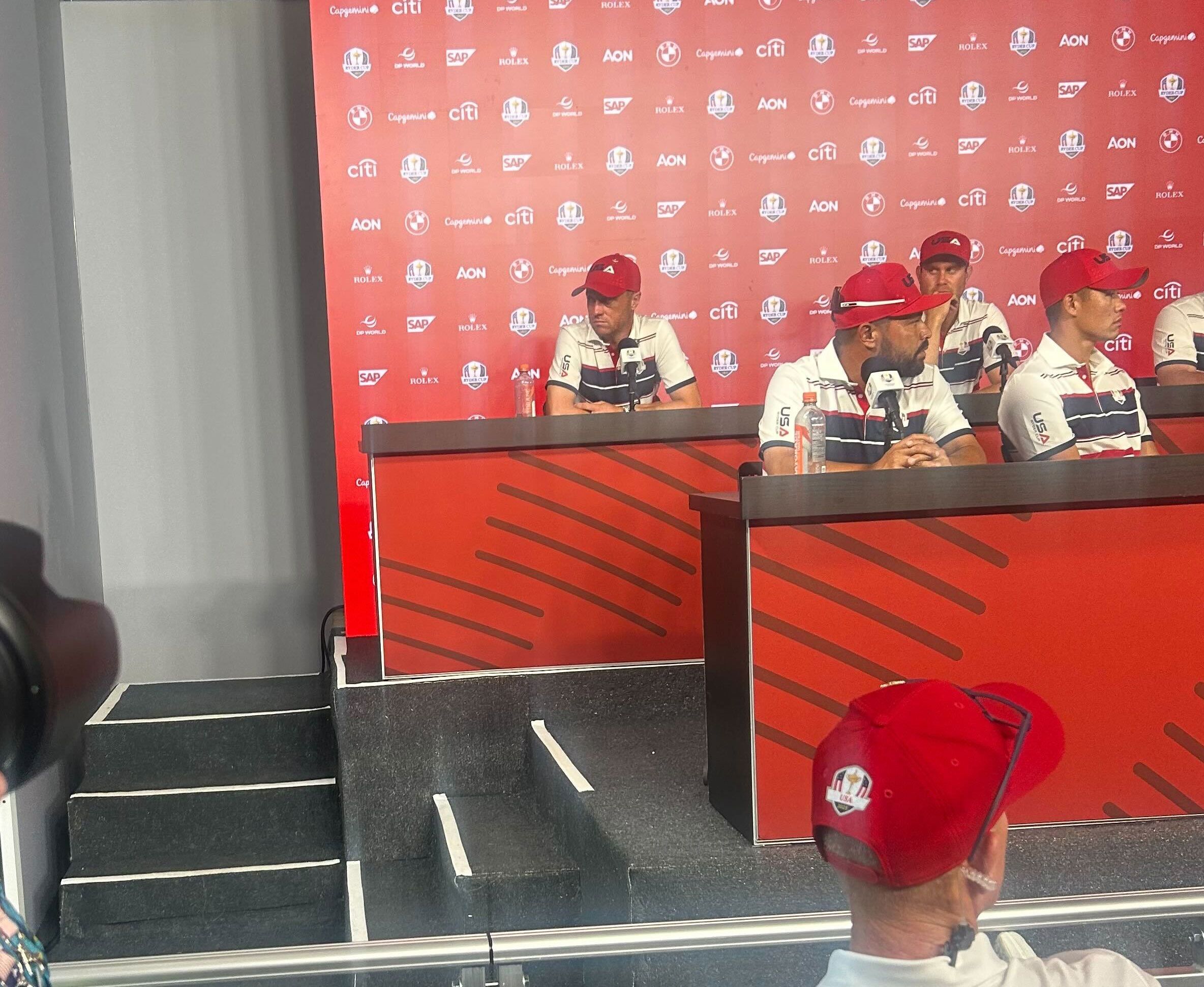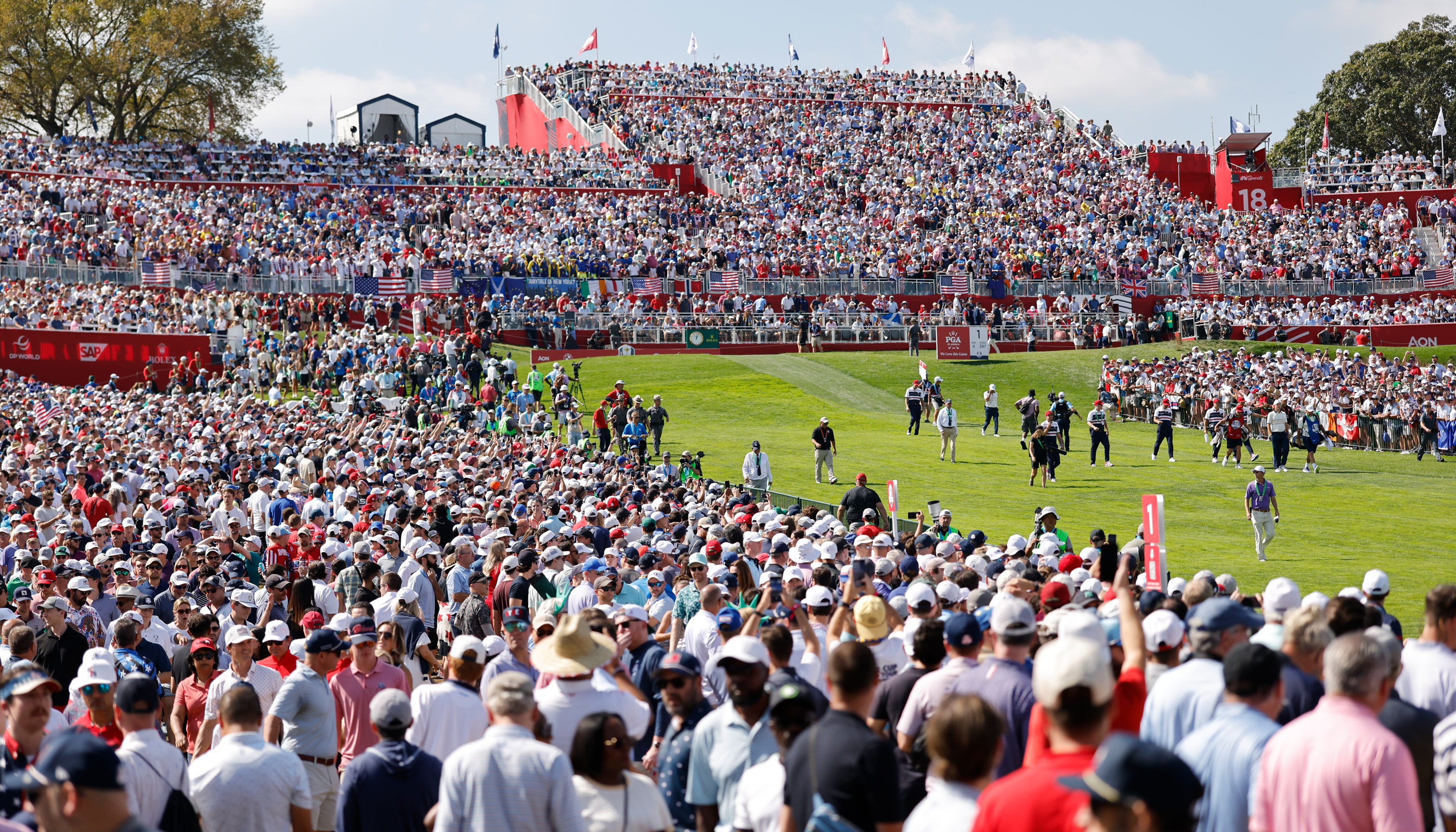1. There is a lot that is overwrought about the Ryder Cup. Every two years, it produces some of the smartest commentary and some of the dumbest commentary, and 2025 was no different. But one element of it that remains underrated, at least for me, is the press conferences that occur after the event is over.
They are such a study in contrast. The winners are usually jubilant, passing beers around and cracking jokes that sometimes can be heard over the mic. The losers are silently distraught, mumbling to themselves and carefully weighing their words because they know everything is being scrutinized. The losers typically appear in the room first, mostly because they just want to get it over with, and typically the winners are still celebrating with fans right outside the room.
The weight of history hangs in the air, however, in both press conferences. I always feel an obligation in these moments to ask something big, something sweeping, because while the role of the press will always be small compared to the actual competition, how the captains and players talk about it is a big piece of how the event is going to be put in context, not just for the next two years, but for the next 20. As a journalist, you only get the opportunity to ask one question in these moments, so both the question and the answer often feel like a chance to put the entire event in historical context.
Luke Donald understands this as well as any captain who has ever held the role.
“We’ll always remember this. We’ll always go down in history,” Donald said, in response to a question about what matters more, individual accomplishments or team accomplishments. “We talk about all the people that came before us that paved the way for us. Now future generations will talk about this team tonight and what they did and how they were able to overcome one of the toughest environments in all of sport.”
As Donald was saying these words, I was thinking back to something I’d witnessed 10 minutes prior, at the American press conference. The U.S. players were answering some questions about set up, about pairings, and about disappointment, but Justin Thomas wasn’t really paying attention. He was staring out the window, watching the European Ryder Cup squad as they danced and celebrated on the putting green just outside the door. It wasn’t performative, like Stefon Diggs watching the Chiefs celebrate the AFC Championship, and making sure everyone saw him. It was a candid moment of genuine misery. Robert McIntyre was prancing across the green like he was at a wedding reception, and the European crowd was serenading him as he went. Thomas sat there in silence, taking it all in.

 Justin Thomas during the U.S. team Ryder Cup press conference (Fried Egg Golf)
Justin Thomas during the U.S. team Ryder Cup press conference (Fried Egg Golf)
It made me wonder if Thomas ever feels like he was born on the wrong continent. This was his fourth Ryder Cup, and while I sometimes think the Americans go overboard with the way they talk about him — like when Zach Johnson said he could not leave Thomas at home because he was born to play in Ryder Cups, even if he was playing poorly — I think it eats at him more than most that the United States can’t figure this out the way Europe has. This is, after all, the person who said at age 22 he would rather win a Ryder Cup than a major. He was laughed at by some for that take — Chris DiMarco, I recall, was incredulous on Golf Channel — but it highlighted how unique Thomas is in the way he views this event. He wants what Europe already has, a golf culture that lives and dies with this event. It was more apparent than ever on Sunday night that he is the spiritual heir to Payne Stewart, Corey Pavin, Lanny Wadkins, and Larry Nelson.
It’s a lock that Thomas will be a Ryder Cup captain someday. He’s going to have his chance to ask 12 guys to buy in on the mission the way he does. He’ll have a chance to get all the prep right, and the details right. I promise you, he’s paying attention to all this talk of what makes Europe successful. And while that feels like it’s still far away, it’s also important to remember that Thomas is 32 years old. He’ll be 36 when the Ryder Cup returns to Hazeltine in 2029. He might only have two, maybe three cups left as a player.
He wasn’t just watching Europe throw a victory party. He was watching another chance slip away while also understanding he has only so many left.
{{inline-article}}
2. I thought Sports Illustrated’s Michael Rosenberg made a strong point with this column that hasn’t been given enough weight: For all the mistakes Keegan Bradley may have made at Bethpage, you can’t tell the story of American Ryder Cup failure without talking about who isn’t part of the squad.
When America won Ryder Cups at Hazeltine and Whistling Straits, it looked like Patrick Reed, Brooks Koepka, Jordan Spieth, Dustin Johnson, and Rickie Fowler would be pillars of the team. Even if a couple of them dropped off, there were others who could fill those roles. Max Homa, Tony Finau, and Wyndham Clark all looked, at one point, like they would play on multiple teams in their prime. And young talent like Matthew Wolff and Will Zalatoris would soon be filling out the bottom of the roster.
None of those players received serious consideration this cycle.
The reasons for their absence are certainly unique to each player. LIV Golf’s emergence somehow managed to help the Europeans (by elevating Luke Donald instead of Henrik Stenson) while hurting the Americans, but it would be wrong to put all the blame on LIV. The deterioration of the American bench had a plethora of causes.
Reed had already alienated his teammates in Paris prior to LIV’s emergence, and he managed to erase two stellar Ryder Cups on his resume with a terrible performance at Le Golf National. Koepka was part of the team in Italy, but his game was a shell of itself this year on LIV and in majors. Johnson appears to have what amounts to a passing interest in professional golf. Spieth had wrist surgery and has struggled to return to form, spurring questions about whether he’ll ever be one of the 12 best American players again. Homa and Clark are trying to dig out of the wilderness. Zalatoris has been wrecked by injury and may never live up to his potential. Wolff’s game has deserted him to the point where he had just one top 10 on LIV this year, despite playing in fields of 54 or fewer. He hasn’t played in a major in three years.
Throw in the fact that Phil Mickelson blew up the American succession plan for captaincies when he went to LIV and became a pariah and well … it’s quite the hole to fill.
If America is going to have any chance to break their streak of road losses in the Ryder Cup (which will reach 34 years by the time Adare Manor arrives) they have to hope either some combination of Koepka, Spieth, Homa, Zalatoris and Clark returns to form or a new generation of stars (likely led by guys such as Jackson Kouvin and Luke Clanton) emerges like Spieth and Thomas did right out of college.
3. A lot has been said and written about the American fans at Bethpage who spent all of Saturday saying horrible things about the European players and their families, but I’d still like to have my say here because I’m not sure anyone has quite nailed how I feel:
Those people are losers. And they are cowards. I cannot stress this enough. They are — sadly — a reflection of what we’ve become as a society, where being an asshole can often be seen as a badge of honor. Shame is no longer any kind of guardrail to American behavior. There are a lot of reasons for this, but it would be a lie to pretend it isn’t a new low for golf fans. PGA of America President Don Rea trying to dismiss it as normal with a wave of his hand, saying he’s heard bad things at youth soccer games, revealed a level of buffoonery that would likely get him sacked by any of golf’s other governing bodies, but instead might get him a raise at the PGA of America.
 Sunday at the 2025 Ryder Cup (Michael Reaves/PGA of America)
Sunday at the 2025 Ryder Cup (Michael Reaves/PGA of America)
The European players have a right to feel upset, because this has been brewing for years. At Hazeltine, when fans got rowdy and were disrupting play by yelling things as European players stood over the ball, I grabbed Justin Rose after a match and asked him what he thought about the crowd.
“I think America has to be careful or we’re at risk of ruining this event,” Rose said.
I thought it was hyperbolic at the time, but now it feels prescient. Hazeltine was downright pleasant compared to Bethpage.
Don’t be swayed by any argument that tries to wash away what happened by saying that it happens at other professional sporting events, or that European soccer crowds are even worse, or that Rory McIlroy and Shane Lowry were egging it on by telling the crowd to f— off in return for the abuse they were suffering through. Don’t rationalize the arguments that everyone knew it was going to be bad if the Ryder Cup went to Bethpage, so what did they expect?
If you’re a grown man and you spent an afternoon screaming horrible things at a professional athlete, trying to get under his skin by calling his wife a whore and hoping he (and she) will hear you, but you still wanted to be able to slither away before police arrive to kick you out, your parents and grandparents failed you. If Rory McIlroy walked into your living room on Sunday night, I am quite confident you would melt with embarrassment or turtle up in fear. You have become so desensitized by the internet and the fake life you live inside your phone that it would take years of therapy just to reset you to your factory settings.
But let’s put all that aside for a second. Let’s focus on the funny part.
It’s hard to stress how badly you misread the situation. If you wanted Rory to come up short, you should have spent the afternoon praising him, as plenty of golf media people can attest! Rory McIlroy plays his best when he’s got a chip on his shoulder.
If you’re one of those morons who spent an afternoon screaming about the state of his marriage, not only did you debase yourself, embarrass the state of New York and your country, you got repeatedly clowned in the process. Imagine spending thousands of dollars to attend the Ryder Cup, then shelling out hundreds of additional dollars for cheap beer and mass-produced food, screaming at Rory McIlroy and his family for an afternoon in an attempt to help your team, only to watch him throw darts at pins and kick American ass over and over.
What did you debase yourself for, in the end? Your place in the Loser Hall of Fame is secure. McIlroy just won his sixth Ryder Cup, his second in America, and all you got for your efforts was a lighter wallet and a sunburn.
You got emasculated by someone who will never even know your name.








